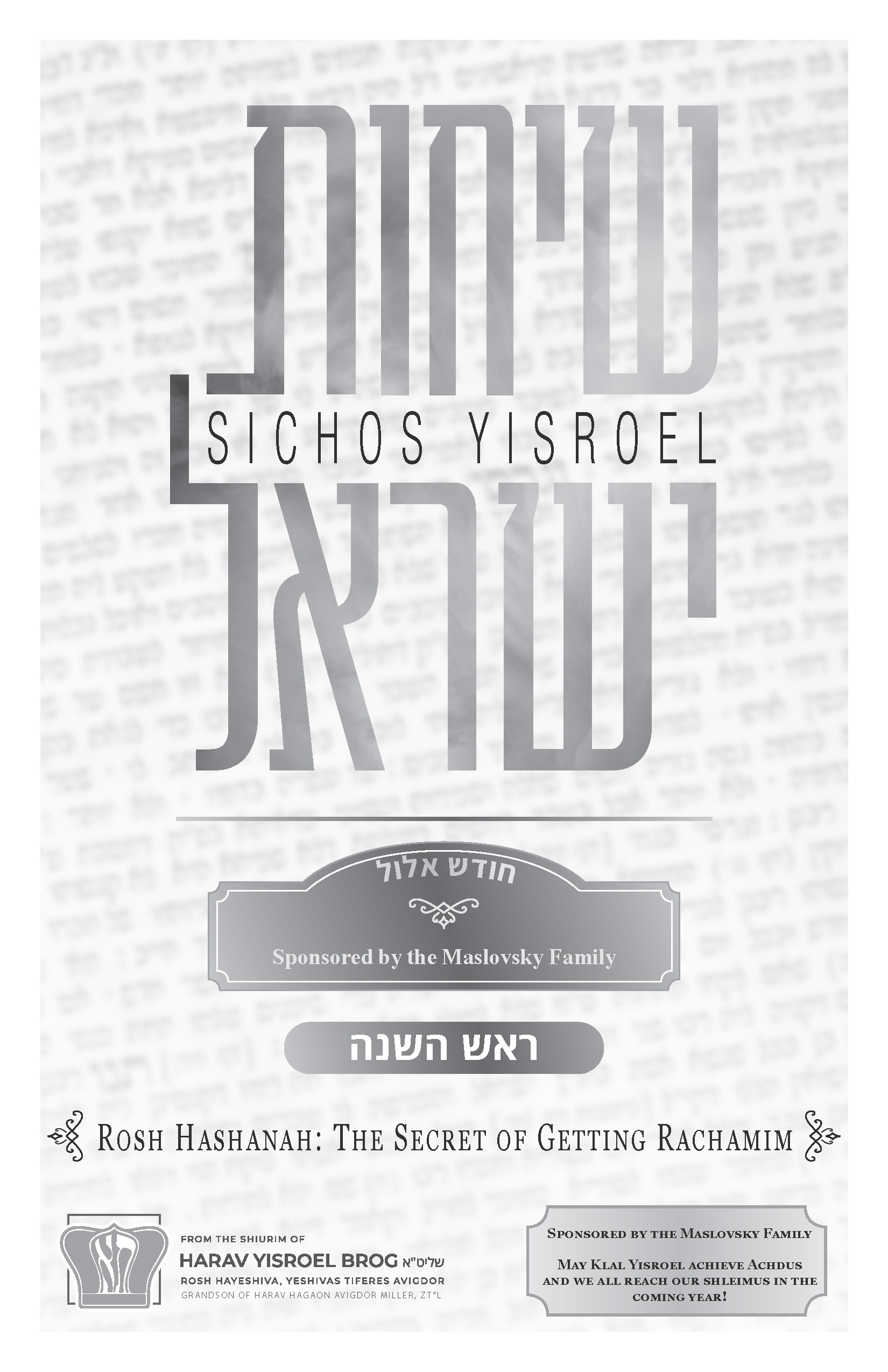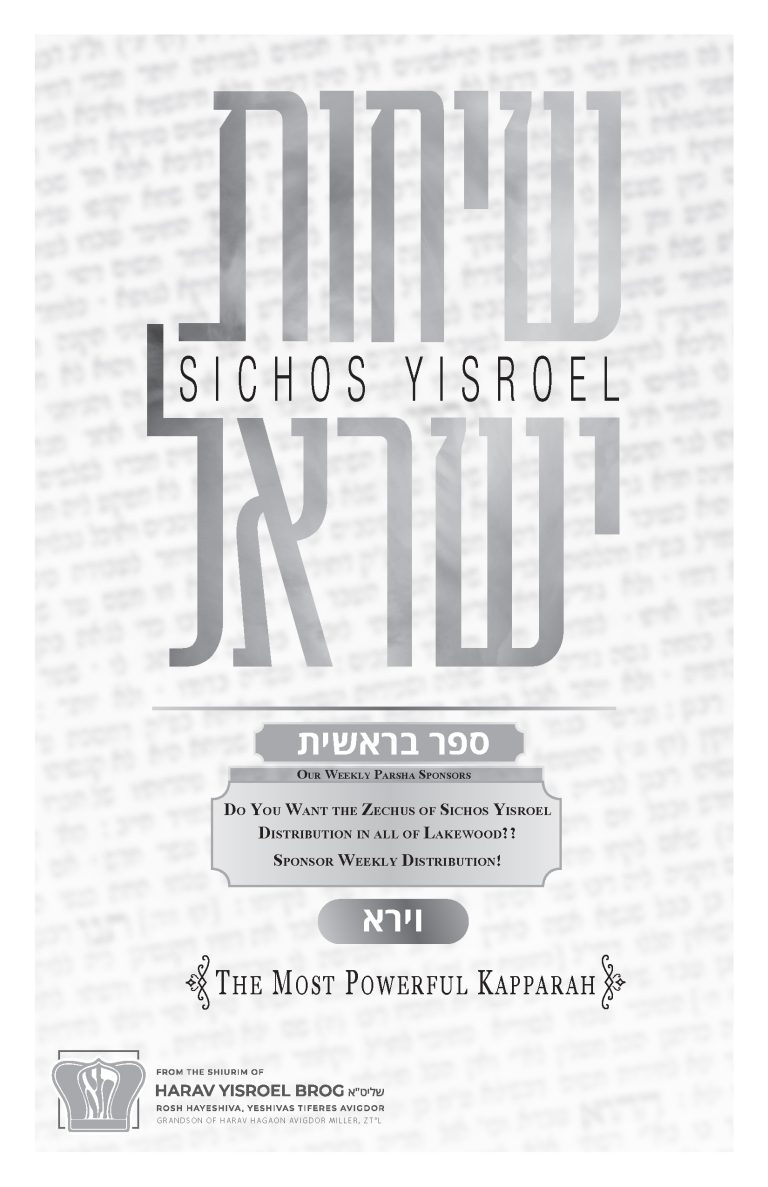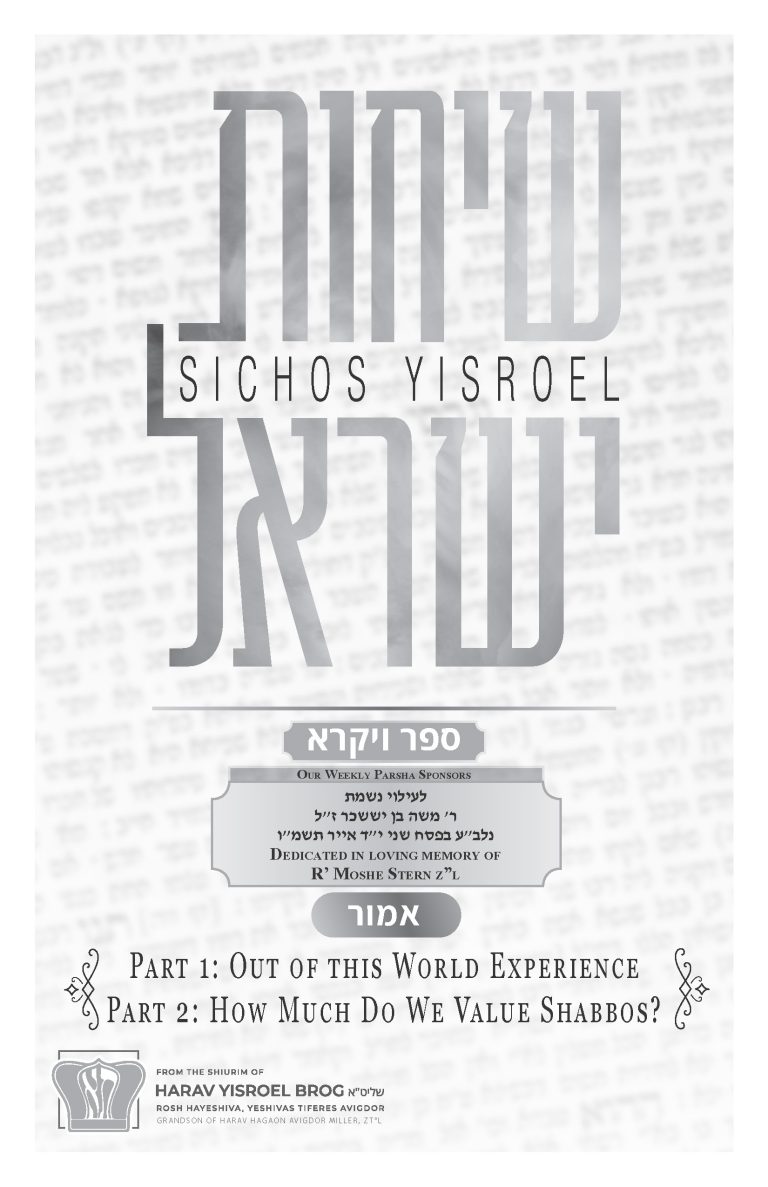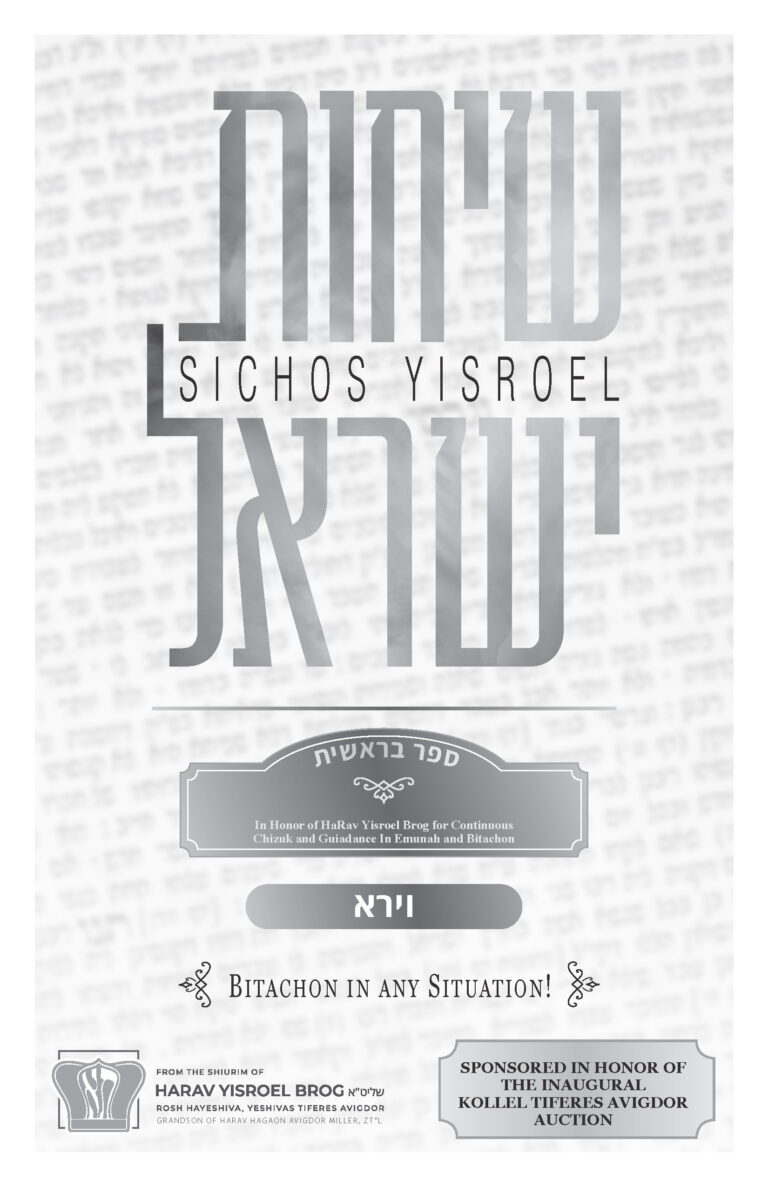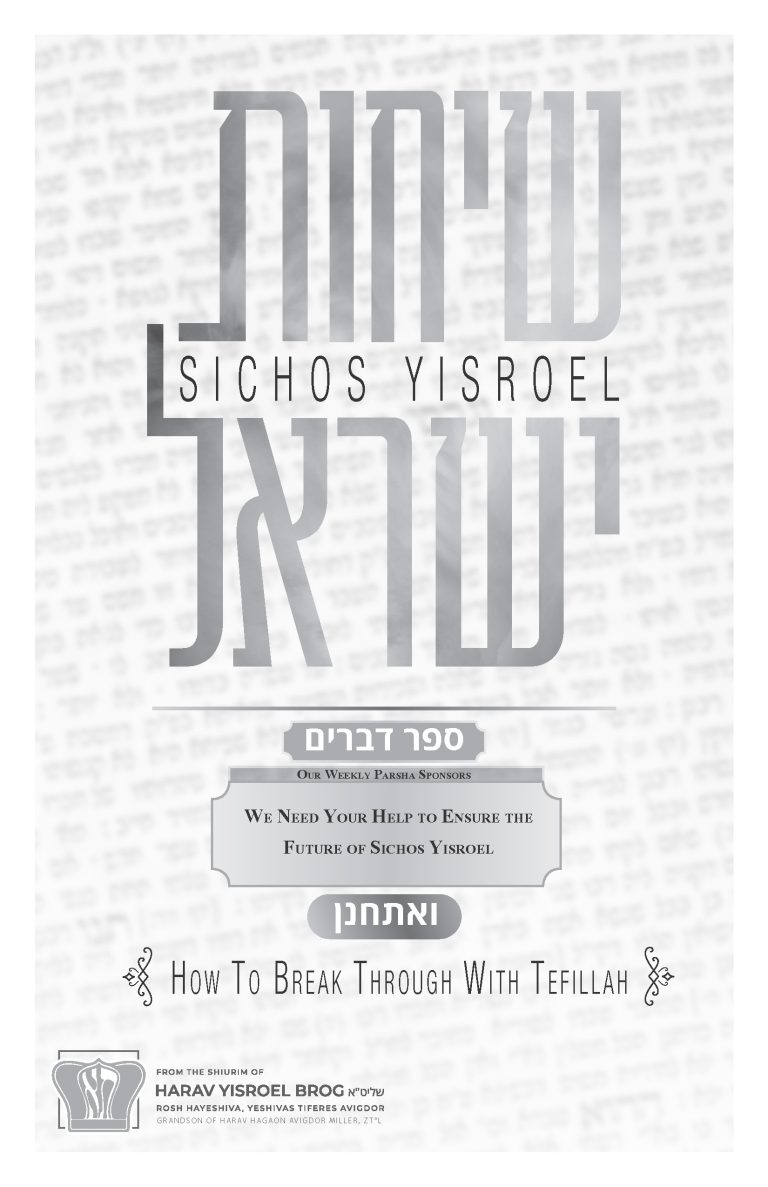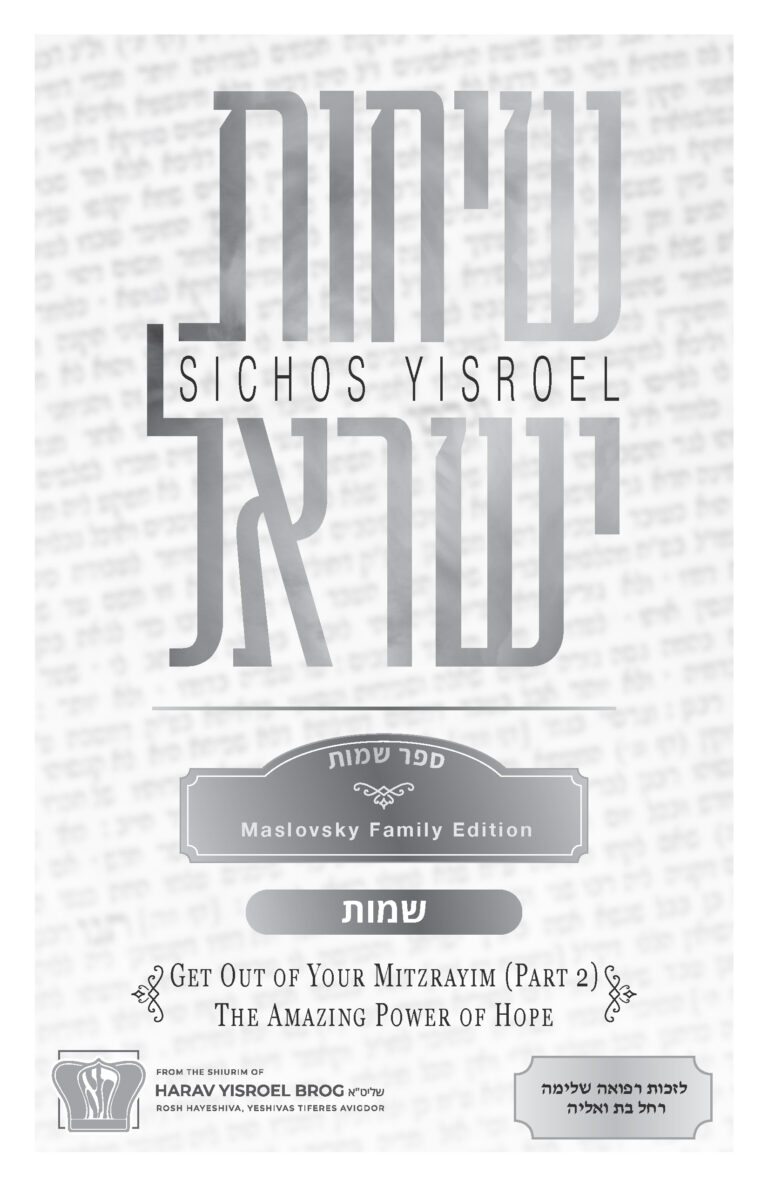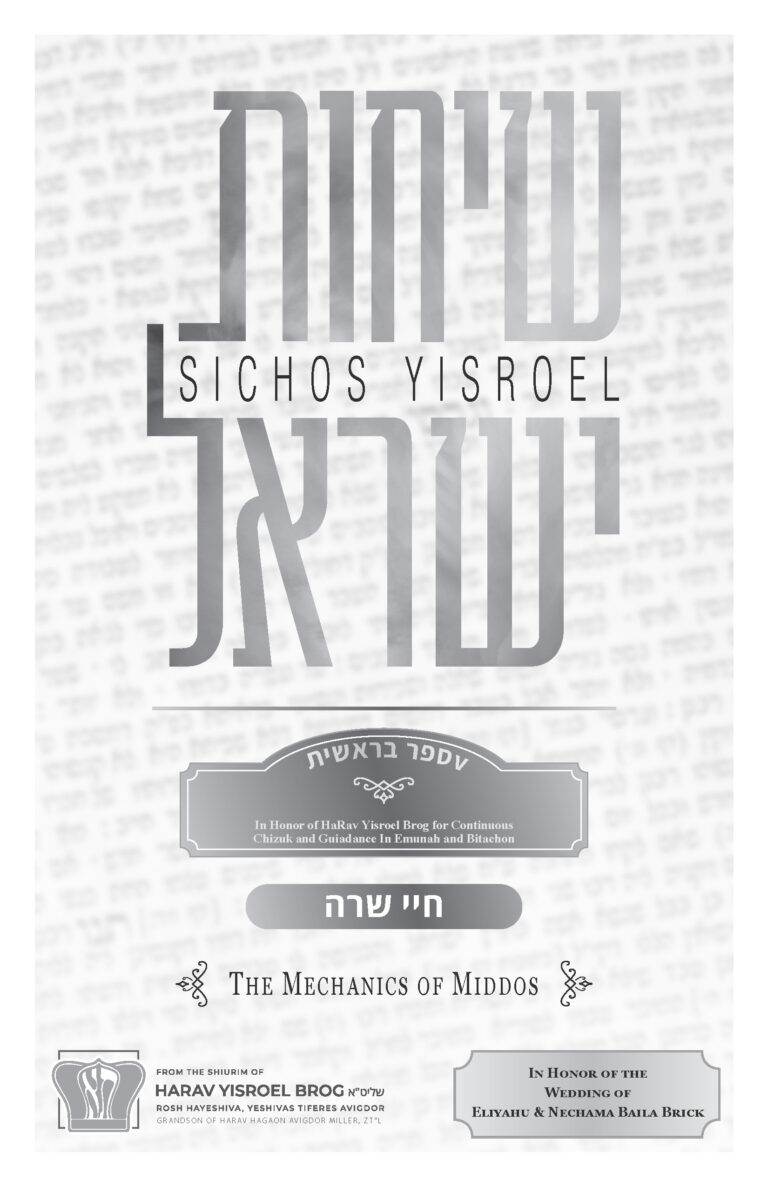Rosh Hashanah 5784: The Secret of Getting Rachamim
Sponsored
Sponsored by the Maslovsky Family: May Klal Yisroel achieve Achdus and we all reach our shleimus in the coming year!
Consider sponsoring a shiur
Visit YTATorah.org
Shiur presented in 5777
How to Receive Rachamim on Rosh Hashanah
We are approaching the end of the year. What’s coming in a couple of days is the day of mishpat, of judgment. If a person would take into account the mishpat that he got last year and think about what kind of maasim he is presenting to the Ribbono Shel Olam, he might become afraid. We say מי יצדק לפניך במשפט, who could make it through the mishpat? So what we desperately need is middas harachamim, the application of Hashem’s attribute of mercy. Middas harachamim is the existence of rachmanus even in the face of a difficult matzav. We need rachamim to get through the upcoming mishpat. So the question is, what does a person do when he needs to receive rachamim?
It is kedai to remember this discussion, because it is a guide to what you should do throughout your life, not just in Elul. Many times, you are going to experience the need for rachamim. You might be sick, or you might be poor. Maybe your spouse will be sick, maybe your child will be sick. Chas v’shalom, it shouldn’t happen to you or to any of us, but these things do happen. Then everybody wants to know, what do you do? Sometimes you get a speeding ticket, and then you get a second ticket. When you get a second ticket, the costs start to build up. You need rachmanus, they’re almost taking away your license! They could even send a person to ‘the big house’ to rest up and think over his actions. People think it’s a joke, but unfortunately, these things do happen. You should never know from it, but I have walked people to jail who never dreamed they would be in jail. When you watch the doors clang shut on them, it is very, very sad.
So what should you do? The Mesillas Yesharim (Ch. 19) quotes the gemara in Shabbos (151b):וְנָתַן לְךָ רַחֲמִים וְרִחַמְךָ, Hashem will give you rachamim (Devarim 13:18). How does Hashem give rachamim to a person? כל המרחם על הבריות מרחמין עליו מן השמים. This means that anybody who is merciful to other people, from Heaven they are merciful towards him. It’s that pashut! The Mesillas Yesharim explains: כי הקדוש ברוך הוא הוא מודד מדה כנגד מדה, HaKadosh Baruch Hu treats a person midah k’neged midah and מי שמרחם ועושה חסד עם הבריות, someone who has rachmanus and does chessed with the briyos, גם הוא בדינו ירחמוהו, Hashem will be merciful on him in his din. וימחלו לו עונותיו בחסד, and He will forgive his sins with kindness,שהרי מחילה זו דין הוא, since this mechilah is actually din. That’s how the system operates! כיון שהיא מדה כנגד מדתו. It is a middah side by side with his middah.[i] This is incredible!
Carrying Our Sins
Do you hear what it says over here? It says over here a davar nifla. A person has the keys in his hands. Each person is holding the keys that allows him to open up the doors of rachmanus for himself, even while he has sins. He earned himself chessed! He is going to get chessed be’din. That’s amazing! And the Mesillas Yesharim says, azoi shtait in the gemara in Rosh Hashanah (17a): לְמִי נוֹשֵׂא עָוֹן – “Whose sin does He Hashem bear?” This is what was stated in the 13 middos harachamim that were transmitted by Michah Hanavi, that two of those middos are juxtaposed to each other. One is נוֹשֵׂא עָוֹן, and the other is וְעוֹבֵר עַל פֶּשַׁע – Hashem bears the sin, and He overlooks the sin. Chazal say, Hashem Yisborach is נושא עון, He bears the sins for a person who is עובר על פשע, a person who overlooks other people’s wrongs to him! You have to know that Hashem is going to bear your sins.ומי שאינו רוצה להעביר על מידותיו, but if there is a person who does not want to be מעביר על מידותיו, he does not want to forgive others, , or he doesn’t want to do chessed (i.e., such as if a person says, the guy did something wrong, he’s got to pay the price) so what happens to that person? הנה הדין נותן the din dictates שגם עמו לא יעשו אלא שורת הדין, that also with this person, forbearance will not be practiced, אלא שורת הדין, but his judgment will go according to the letter of the law.
Do you hear this?! Do you understand what this means?! It means that without rachamim every one of us is toast. It’s a nes that our ears did not fall off our heads yet. It’s a nes that your eyes did not pop out of their sockets. (Did you ever meet people whose eyes pop out? I always think when I see that, that Hashem is letting me know, “The only reason why your eyes are in your sockets, is because I pushed them in a little more.”) The Mesillas Yesharim says, ראה עתה, see now, think and contemplate, מי הוא זה ואיזה הוא, who is the one שיוכל לעמוד who will be able to withstand אם הקדוש ברוך הוא עושה עמו שורת הדין, if Hakadosh Baruch Hu will interact with him strictly according to the letter of the law? Do you stand a chance if Hashem interacts with you according to your sins? Take your mouth, for example; you are a thief with your mouth, non-stop. You ate without brachos, before and after eating. You spoke lashon hara, motzi shem ra, rechilus; you were involved in bittul Torah, leitzonus, nivul peh, and kol devarim assurim. And that was just the aveiros with your mouth! What part of you is good? You used your hands to do all types of sins. With your feet, you ran to do ra. What did you use your mind for? The fact that you still have a mind that works is a nes. You should be emotionally challenged. Your mind should be all over the place. You should be a madman. That is what should be expected because we don’t use our minds the way Hashem intended us to use our minds. If you misuse your mind, you lose it, that’s what happens.
So if we have to rely on shuras hadin, we don’t stand the slightest chance. ודוד המלך מתפלל ואומר even Dovid Hamelech, who was such a tzaddik, begged for rachmanus from Hashem. Dovid Hamelech davened and said (Tehillim 143:2), אל תבוא במשפט את עבדך – “Please, Hashem, don’t come with justice to your servant.” Dovid Hamelech, who knew he was an eved Hashem, (he described himself as אני עבדך בן אמתך), said, “Please, אל תבוא במשפט.” Do you know why? כי לא יצדק לפניך כל חי – “no living creature can justify their existence before You.” If Hashem is going to be medakdek with living beings lefi middas hamishpat, according to the strict letter of the law, nobody is going to make it. So what’s the eitzah?
The Boomerang Effect
אמנם, the Mesillas Yesharim enlightens us with the following: העושה חסד מקבל חסד, someone who does chessed will receive chessed. וככל מה שירבה לעשות and the more he will increase to do chessed, כך ירבה לקבל, the more he will recieve chessed from Hashem . We can learn this from Dovid Hamelech, ודוד היה מתפלל במדתו זאת הטובה. He says that Dovid praised himself, that he had this good middah, שאפילו לשונאיו even to his enemies היה משתדל להיטיב he tried to do tov. וזה מה שנאמר, that is the meaning of the passuk where Dovid said, ואני בחלותם and I, when I saw my enemies, my pursuers, in their sicknesses. How would we feel if we saw people who tried to pursue us, people who sought our evil, if they got sick? What would we say? Baruch Hashem, יש דין ויש דיין. We would say Hashem took care of business, אשרני, I am fortunate. But Dovid Hamelech said, ואני בחלותם לבושי שק – “I wore a sackcloth,” עניתי בצום נפשי, “I fasted for them,” so that they should get better. Do you hear that? Could you imagine that?! You know what kind of chessed that is? Dovid Hamelech prided himself on that. שאפילו לשונאיו – he did that even for his enemies! ואומר and it says in the passuk אם גמלתי שולמי רע, he asks: “Did I ever pay my enemies back with evil? No. Even my enemies who thought I was their enemy, I was never their enemy, I only did tovah for them.” That’s what the passuk (Tehillim 7:5) says: ואחלצה צוררי ריקם – “I’ve rescued my enemy without reward,” I saved those who tried to kill me and destroy me. I saved them even though I had a chance to harm them. ריקם – I did chessed to them for nothing; I saved them without gaining something for myself.
Rabbosai, every one of us has this opportunity to be marbeh chessed. You could do chessed to other people. If you would do chessed, you would be zoche to tremendous chessed from Hashem. But you don’t do chessed.
Oh, you like to make money? That, yeah. To take from this world for yourself? That you love. You’re willing to shvitz for a few pennies. But to do chessedwith no obvious gain, is too hard.
Extreme Chessed for Extreme Rachamim
When you do something for somebody else it takes effort. Hashem is not paying you back for chessed that you do for others, when ‘this is what I choose to do, this is what I want to do’ and it takes no effort. For doing things without effort, you get things back without effort. If you want to do things with effort, you have to push yourself. People always call me and they ask, “What should I do?
A family called me for advice because only one of their children is married. Out of a 33-year-old, a 31-year-old, and a 29 and 27-year-old, only one is married. The one son-in-law they have, called me up and he said, “I feel very uncomfortable in this family, I feel like I’m doing something wrong. I’m married. That’s a dirty word in this family. No one else is married.” He asked me, “I want to know what I could do for them.” I asked him, “Did you find somebody who they were metza’er? Because if you cause pain to people, and you don’t do chessed, Hashem is metza’er you. Azoi shtait in Mesillas Yesharim – ומי שאינו רוצה להעביר על מדותיו או אינו רוצה לגמול חסד, הנה הדין נותן שגם עמו לא יעשו אלא שורת הדין – But he who is not willing to overlook transgression against himself, or act with kindliness, justice dictates that he too will be dealt with only strict justice. I asked him, “Did they ever hurt an almanah?” He said, “Well, there was one almanah...” I said, “Nu?” He said, “But we took care of that already. We sent somebody, and we appeased her.” I said, “How were they mefayes her? How do you know she was appeased?” He said, “Because she said so.” I asked, “What did you do? Did you give her anything?”
So they ‘took care’ of the almanah, I thought. I continued, “You know, I’m afraid that perhaps that almanah wasn’t so appeased.” He asked, “So what could we do?” I said, “You could appease her but that’s not going to give you rachamim, because you did a terrible thing. You started up with an almanah. But I’ll tell you what you could do. Go help an almanah. Have your family, all the children and the parents start to raise money and to do rachamim. Go in Hashem‘s footsteps and raise money to marry off a yesomah. Or how about marrying off an almanah?” He said, “Could we write a check?” “No,” I said, “don’t write any checks. Hashem wants to see you putting in effort to be merciful to others. You have to do such chessed. It’s got to be extreme chessed if you want extreme rachamim.”
I told the guy, “If you are in this situation where none of your siblings are married yet – they are 33 already, we are not talking about 19, we’re not talking 21, we’re not talking about 22, even 23, that’s normal. But someone who’s 33 already, you know that’s a serious decree on a person. That’s very serious. You don’t have kids for 10 years? That’s a serious gezar din. That’s not an easy thing.” You should never know from it. People go through that torture. Their nights are not nights and their days are not days. They can’t go to simchos – they can’t go to family simchos, they can’t go to stranger’s simchos. They can’t live in the neighborhood anymore. They can’t leave their house. In my house all I hear is babies, I come out and I hear also babies. Don’t talk about babies, it’s torture for them. What’s the yeshuah for a situation like this? Do chessed, do extreme chessed. It’s got to be an extreme chessed. If you want to do that, that’s going to bring a yeshuah.
Measure for Measure
It’s chessed b’din. Hashem says if you messed up an almanah, now, marry off an almanah. Then you’re going to have chessed while in the state of din, chessed bedin, הנה הדין נותן. But people can’t seem to do it. I can’t get over how people can’t do it. They can’t rise to the occasion. This family agreed to do it, we’ll see what they come up with. (A guy called me last year, and he told me he’s in a terrible matzav, brick wall, hopeless. I said, do this extreme chessed, and he did it. He was answered in four weeks! In four weeks he was answered. You think it’s not worth it?!) Of course, we had to find out about the almanah that he was metza’er. We had to appease the almanah. Now that we took that accusation off, that doesn’t give you rachamim. Now, you have got rid of the problem, now you have to turn up the heat for the rachamim. But if we say, “I can’t,” that’s a problem.
A bachur needs rachamim when a bachur needs a shidduch. A 26-year old bachur called me up and he told me that he needs a shidduch. I said, “So have rachmanus, bring rachmanus to yourself.” He said, “What should I do?” I told him, “Do acts of chessed for people. Go raise money. Raise money at chasunos, go do something.” The response: “No, no.” Rabbosai, do you want to be mekabel rachamim from Hashem be’din? I know people who had din in the last year, I think about them in gan eden. It’s unbelievable the tzaros one family could suffer, fires, strokes, deaths. I mean not stam, extreme. He’s no different than me, you’re no different than him. Yet the din was 10 times worse. You know what Hashem says, כי לא יצדק לפני כל חי – “No one could make it in front of Me.” If you want to make it, do something for others!
You have a simple eitzah. What could you do? Be mekabel upon yourself, “I’m going to undertake to do acts of rachamim for others. And I’m going to be מרחם על הבריות. And I’m going to undertake that this bein hazmanim, instead of sitting around and doing who knows what, I’m going to take some time out, I’m going to go raise money for poor mishpachos.” Ah, that’s not your type. It wasn’t my type either. Hashem did me the chessed of my life and He pushed me into it. Hashem pushed me straight into the fire (i.e. He caused me to take up the challenge.) The story took place years ago when I was an unmarried bachur.
Pushed by Hashem To Do Chessed
A guy in Eretz Yisrael borrowed 10 grand. He told the guy who lent him the money, “Yisroel Brog is going to America now and he is going to bring back the money.” Meanwhile, he was planning on asking me to raise that money. So he borrowed $10,000 on that cheshbon. My rebbi warned me to stay away from a certain place so that I shouldn’t bump into that guy. He didn’t tell me why. He just said, “There’s a certain yid who’s going to invite you to his house. Don’t go. As soon as he comes to you, make it look like you’re busy.” He knew this guy used to take advantage of people. He wasn’t a bad person, he was a talmid chacham, who needed money. He used to try to get American boys to raise money for him in America. He tried to make a network. Some people like to get a network of people to sell esrogim for them, and here you have a network of people to collect money for him. That was his thing. So he sent me a letter in the mail. “Don’t be mevazeh me, don’t be mevazeh yourself, don’t cause shame, please do me a favor and raise the money.” Nu? My father said I didn’t have to do it. I said I would try. From that story, I got into the business.
When I was a chassan, I was in a certain town and I needed to borrow $700. I could not get my hands on $700. There were maybe 25 to 50 gemachim. The most they would give me was 25 bucks or 50 bucks. I was thinking, “This is called gemillus chassadim? This is called being mevazeh a person, being machshil a person. That’s called extreme rachamim? That’s called chessed? You think that’s what Hashem meant, when He said to lend people money? 25 bucks?” I wasn’t 12-years-old. I told someone, “I’m getting married in three weeks.” I tried all types of gemachim in different circles. Maybe $100, maybe $150, how do you know where it will come from? But no, the loan wasn’t forthcoming. I couldn’t understand this. I said, “When I get married, I’m opening a gemach no matter where I am!” And I did! I took my money and I put up a sign in Telshe Yeshiva, ‘Gemach for chassanim.’ You are a chassan? You need money. That day, two chassanim came over to me. And how much do you think each one needed? $700. I said, “Wow. Hashem, I hear You loud and clear. Loud and clear.” And since then it’s been millions. Baruch Hashem, Hashem kept an eye on us and Hashem helped us and it blossomed. That’s the story.
Chessed Is Not Easy
Once a man came to me when I broke my foot. He wanted to borrow $4,000. I knew this guy had a track record of not paying back; he only gave rubber checks. So he came to me and I thought to myself, “My foot is broken. You come to me to borrow, and you think you could steal from me?! You’re not going to pay me back.” I didn’t say that, of course. I said, “Of course I’m going to give you the money,” but then, I told him, “There’s onecondition. You’ve got to get me an arev, a guarantor.” He said, “I have a guarantor.” I called that guy up and said, “My friend, I am happy to give him the loan, but I want you to understand that there is a 99.9% chance that your check is going in the bank, and with this awareness you are guaranteeing, because there’s something about his checks. They have a problem, they lack the backing. There are no backs to those checks, just fronts.” He said, “Okay, I understand.” I gave him the money, and the guy was happy. When the time came to pay up a few months later, like clockwork, the check bounced. The next day, I put the other guy’s check in, thank you. When I met the guy who borrowed the money, I said to him, “You could borrow again, it’s covered.” That’s how it is. You’ve got to do chessed. That’s what it’s about; doing chessed.
Let me tell you another story. The idea is that the more you run after acts of chessed and you chap bizyonos, the more merit you have. Rabbeinu Yonah writes a peledige zach. He writes that a person could have a kapparah from the aveirah of chillul Hashem! There is no aveirah like chillul Hashem, you can’t really get a kapparah for chillul Hashem. But you’ve got to know something. If you pursue chessed, it could cancel out the chillul Hashem. To understand this, I will share with you a story that Rav Nosson Wachtfogel told.
A Strange Dream of the Alter of Kelm
One night during chodesh Elul, the Alter of Kelm, the great baal mussar, the master oved Hashem, was sleeping in his bed. All of a sudden, he had a chalom, a dream. In the dream he saw Rabbeinu Yonah coming to the city of Kelm. Rabbeinu Yonah was coming to Kelm and the announcements were made that Rabbeinu Yonah was going to speak in the beis midrash in Kelm at this and this time. When it was time for Rabbeinu Yonah to speak, the Alter saw everybody, all the Yidden, closing their businesses and coming in droves to hear Rabbeinu Yonah. It was an opportunity of a lifetime! Kelm was a city where they could appreciate Rabbeinu Yonah. In Kelm, Rabbeinu Yonah was mamish something. To hear a shmooze from Rabbeinu Yonah biyemei Elul? What could be better?! The Alter of Kelm saw that he himself was amongst the people that were coming to that shmooze. But when he came to the door of the beis hamidrash, they stopped him and they said, “What’s your name?” So he said, “My name is Simcha Zissel.” The shomer said, “We’re not letting you in, no way!” He protested, “But I want to hear Rabbeinu Yonah. A baal mussar bin ich, I’m a talmid of R’ Yisrael Salanter!” Gor nisht. Nothing doing. He said he saw himself in his chalom pashut bursting out in tears, mamish. He started to mention his fathers, his grandfathers, his rebbeim. He started mentioning the zechus harbatzas haTorah, how much harbatzas haTorah he had. He reached out to thousands of talmidim! They were all extremely chashuv. He was hoping that maybe the shomer would let him in in their zechus. Gor nisht. The shomer stood his ground, “You can’t come in.” When the Alter saw this, he had a different thought. He turned to the shomer and he said, “I want you to know that my son is Reb Nochum Velvel.” The shomer said, “Ah, Reb Nochum Velvel! Kumt arein! (Come in!) And he let him in. That was the last thing in his life that he thought would help. The shomer was going to let him into the beis hamidrash because of his son, Nochum Velvel?!
At that moment the Alter woke up, והנה חלום. But he was very very disturbed by it. He was very shaken. He was in a state of turbulence. So he called his son to come to his house. He said to his son, “Tell me what zechus did you recently attain, that because of that zechus they let me into the beis midrash to the drashah of Rabbeinu Yonah? What did you do?”
“I’ll tell you,” Reb Nochum Velvel said. “It’s been a long time since my shoes got worn out and they are very uncomfortable. I once went to the shoemaker and I saw a good pair of shoes. I asked him how much the shoes cost. But I didn’t have money. I didn’t have any money to pay for it. I was certain that I couldn’t pay the price of those shoes. But from that day on, I started saving money, prutah by prutah to pay for those shoes. When I had saved enough money, I went back to the shoemaker and I bought that pair of shoes. One cold, rainy night, not long ago somebody knocked on my door. I went to open the door and saw a schnorrer, a guy collecting money. His garments were mamish torn and he was shaking in the cold. I said to him, ‘Come inside the house.’ And I honored him like you are supposed to be mechabed a guest. Then I gave him some money for tzeddakah. But as he was leaving, I looked at the guy’s feet and I saw that there were no shoes on the guy’s feet.”
My zeide (Rav Avidgor Miller z”tl) once explained to me that in America you can’t believe such a thing could be true. He told me that the first time he saw people walking without shoes, it was unbelievable! People would wear long coats, because they had no shoes. It was also very common that if a person had shoes and there were big puddles, they would take their shoes off, hold their shoes in their hands and walk through the puddles so as not to ruin the shoes. In America, everybody had shoes. There was no such thing as not wearing shoes. Imagine walking in the street and seeing people without shoes. But this yid didn’t have shoes. Reb Nochum Velvel realized that the guy was going out in the cold, nisht pashut. “The yetzer hara started working on me. What should I do? I quickly overcame it. I took off my new shoes and I said to the guy, ‘Here’s a pair of shoes.’”
Have Rachmanus On Others!
Ah! That was the zechus. You see that’s called pursuing chessed, that’s called putting yourself out. What do we do? My zeide said it was very common then, that goyim would knock on the door asking for things. He said, a number of times, he watched goyim knocking on the door of the poorest Jews in Slabodka. The goyim went knocking on their doors asking if they could help and give anything. And the yid would give the goy shoes that looked like rags, full of holes, and the goy would come out of the house dancing. They had something called shoes to put on their feet now! Schnorrer shoes that were already beat up hoshanas. It was nothing, but they could do chessed with it.
You have to do chessed with a little bizyonos. Start yourself a program. During bein hazmanim people like to do things, to go on vacation, and have a nice time. People say, “How do I start?” Try this: Knock on some doors, try to find a zechus. Everybody knows someone who is having a hard time in their life, or can’t find a shidduch. Everybody knows someone you doesn’t have kids, or there was a death in their family, r”l. Just have a bit of rachmanus for others. If you ask, “So how should I do it?” I’ll answer you with a question. Have you ever seen these guys at chasunos in Lakewood?There are guys who collect for hachnassas kallah. They are in your face, and they are at every single chasunah! I don’t know how they are at five chasunos at once! I go from one chasunah to the other and I see the guy at both of them! The first time I spoke to one of them, I said to the guy, “My friend, I want to tell you something, I’m really moved by you.” He said, “Every night this is what I do.” I said to him, “Who do you give the money to?” You know what he told me? “Whoever needs it.” I said, “What do you mean, whoever needs it?!” “Well, people know I collect money. People come to me privately and ask, “Listen, I’m desperate for some money, could I have some?” Just like that.
Gemillus chessed! Rabbosai, you have to be rodef chessed! You have to run after chessed!If you are rodef chessed then Hashem is going to help you too and you are going to be matzliach in your life. Hashem is going to be meitiv with you. A person can have a big koach, he could be mekabel to do chessed and the kabbalah of the chessed itself is as if he did the chessed. It’s unbelievable, Rabbosai! Let’s think about that. Buy yourself some zechusim. It’s a lot better than staying in hospitals and having to stand in hospitals for months with your child or with yourself. You could save yourself and buy yourself life insurance. All you’ve got to do is have a little rachmanus on others. Don’t be afraid. Say, “Hashem, I’m doing it to be מרחם על הבריות (be merciful to people). I want to put something in the bank.”
A Chessed that Saved Someone’s Own Life
A guy came here from Eretz Yisrael, he was in my yeshivah for a while. He was a guy who knew how to learn, a ben Torah, a very talented fellow. He told me a peledige maaseh that happened to him. He said: “I used to learn in yeshivah by Rabbi Shmuel Auerbach, zt”l. I had a minhag. On Fridays I would go to Hadassah Hospital. Hadassah Hospital has a very big cancer ward and I would go to people who were there. I have a talent for music, I made a lot of songs, I made CDs, but Rav Shmuel told me not to sell them because it would take away from my learning.” He decided to use his talent in the right way. He used to go to the patients. They were mamish depressed. Half of them didn’t have any family there with them, their families couldn’t take it. The guy went to the people. He started first by getting people together and singing songs for them, playing music for them and then he went to each person, and he said, “You know, I’m making a special song for you.” He put a thought into it. He made songs for each person who he thought was broken. One day, the head doctor came to him and said, “Who are you? Are you a professional?” He said, “Yeah, I’m a professional. I’m a yeshivah bachur. I do this to be mechazek people.” The doctor said to him, “Come in to my office.” He comes to the doctor’s office. The doctor told him, “I want you to know something. One of the most difficult things with cancer is the bone marrow treatment. First you’ve got to find somebody who is a bone marrow donor, a match, and then to take it out, to put it in, it’s mamish yissurim nora’im. The best bone marrow is a person’s own bone marrow. I want to make you an offer. You look like a healthy fellow. If you want, I would be willing to withdraw for free, your bone marrow, your own bone marrow and put it in the bank. Then, if chas veshalom you ever get cancer and you need it, you have the best bone marrow possible available, as your own bone marrow is better than any other bone marrow.” He told him, “I’ll tell you one thing, removing the bone marrow is more painful than the cancer itself. But the tza’ar you would go through is going to be for you. And you know that once you take it out, it’s bone marrow from a regular healthy person. Who knows what will be tomorrow? You want to do it? Think about it.”
I don’t know how the bachur came to that decision, but he decided that he was going to do it and he did it. A short while later he contracted cancer. The guy got cancer, full blast, but the nes was that he already had his own bone marrow! And when he came to the yeshivah here, he was waiting for the 10-year mark. They told him, “When you hit the 10-year mark and nothing happens, then you know you’re cured. Until 10 years pass, it could come back.” That’s what he told me. 10 years. He actually came to our yeshivah to Cleveland because he thought it was coming back. But the guy was a very happy person. He told me, ”You see what Hashem did for me?! Because I did chessed with these people, pashut, Hashem put it in that doctor’s mind to take out my bone marrow. Hashem put in my mind to go through with it. Hashem knew I needed to go through this. Hashem was preparing for me the refuah before the makkah. I had rachmanus on others, and Hashem had rachmanus on me!”
Rabbosai, let’s prepare ourselves for mishpat. Let’s do something. Let’s put something in our bank. Don’t put your bone marrow in the bank. Put acts of chessed in your bank. But it has to be redifus hachessed! It has to be chessed that comes with some effort. And then in that zechus, you’ll be zoche to have a lot of good things happening to you. Good Yom Tov!
The Bottom Line
Needless to say, as we stand on the doorstep of Rosh Hashanah, we desperately need a lot of rachamim to get through the Yom HaDin; otherwise, מי יצדק לפניך במשפט? The secret to this, as Mesilas Yesharim writes is: ומי שמרחם ועושה חסד עם הבריות, גם הוא בדינו ירחמוהו וימחלו לו עונותיו בחסד, שהרי מחילה זו דין הוא, כיון שהיא מדה כנגד מדתו. Doing chessed for others, outside of our zone of comfort, opens up a door of rachamim for us, even in the face of serious aveiros, where we can actually earn chessed b’din! Each one of us can think of different chessed opportunities and undertake to do acts of rachamim for others (and receiving rachamim in return), which can even cancel out chillul Hashem, as Rabbeinu Yonah writes! If we haven’t started on any chessed projects in Elul yet, let us all, at least, resolve (bli neder) to start one on Erev Rosh Hashanah and implement it during the Aseres Yamei Teshuvah. And in that zechus, may we and our families, merit rachamin b’din!
[i] ואמרו עוד (שבת קנ”א): ונתן לך רחמים ורחמך כל המרחם על הבריות מרחמין עליו מן השמים. וזה פשוט, כי הקב”ה מודד מדה כנגד מדה, ומי שמרחם ועושה חסד עם הבריות, גם הוא בדינו ירחמוהו וימחלו לו עונותיו בחסד, שהרי מחילה זו דין הוא, כיון שהיא מדה כנגד מדתו, והוא מה שאמרו ז”ל (ר”ה י”ז): למי נושא עון למי שעובר על פשע. ומי שאינו רוצה להעביר על מדותיו, או אינו רוצה לגמול חסד, הנה הדין נותן שגם עמו לא יעשו אלא שורת הדין, ראה עתה מי הוא זה ואיזה הוא שיוכל לעמוד אם הקב”ה עושה עמו שורת הדין, ודוד המלך מתפלל ואומר (תהלים קמ”ב): ואל תבוא במשפט את עבדך כי לא יצדק לפניך כל חי. אמנם העושה חסד יקבל חסד, וככל מה שירבה לעשות כך ירבה לקבל, ודוד היה מתפלל במדתו זאת הטובה שאפילו לשונאיו היה משתדל להיטיב, זהו מה שכתוב (שם ל”ח): ואני בחלותם לבושי שק עניתי בצום נפשי. ואמר (שם ז’): אם גמלתי שולמי רע וגו’. ובכלל הענין הזה שלא לצער לשום בריה אפילו בעלי חיים ולרחם ולחוס עליהם, וכן הוא אומר (משלי י”ב): יודע צדיק נפש בהמתו, וכבר יש שסוברים (ב”מ ל”ב): צער בעלי חיים דאורייתא, ועל כל פנים דרבנן. כללו של דבר הרחמנות וההטבה צריך שתהיה תקוע בלב החסיד לעולם, ותהיה מגמתו תמיד לעשות קורת רוח לבריות, ולא לגרום להם שום צער וכו’.
